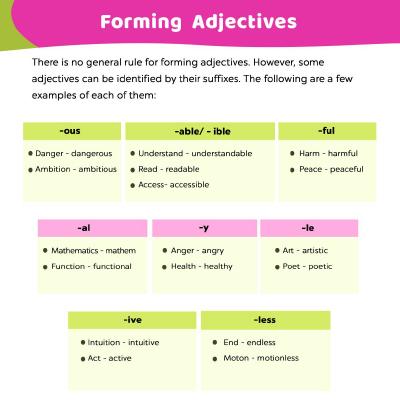The words that add a description to a sentence and alter nouns are known as Adjectives. The words that describe a name, place, person, animal, thing, or that depict the number of the noun are known as adjectives which mean added to. Adjectives are one of the important parts of speech. It could be any single or compound word that modifies the noun.

Forming English adjectives
We can create adjectives from nouns, verbs or even other adjectives by using suffixes (endings) and prefixes (letters placed before the word).
- Examples:
- child → childish (noun + suffix)
- inform → informative (verb + suffix)
- possible → impossible (prefix + adjective)
Although there are many common prefixes and suffixes, there are no fixed rules that tell us when to use which one. The best way to learn is through repetition and practice – which is why Lingolia offers plenty of online exercises to help you master English adjectives.
Making adjectives with suffixes
Many adjectives are formed by adding suffixes (endings) to nouns and verbs.
Many suffixes only fulfil a grammatical role and simply indicate that the word is now an adjective, but there are some suffixes that carry their own meaning:
- The suffix -less means without something, whereas the suffix -ful usually means to have something.
- Example:
- hopeful ≠ hopeless
- However, only few adjectives can be made into opposite pairs like this.
- Examples:
- homeless
- but not:
homeful - beautiful
- but not:
beautiless
- We can add the suffix -ish to nouns and adjectives to change their meaning to like something.
- Examples:
- Don’t be childish.
- = like a child
- The jacket is a bluish colour.
- = like blue
- For some materials, we can add the suffix -en to create adjectives that mean made of.
- Examples:
- A wooden chair.
- A woollen jumper.
- When added to a verb, the suffix -able creates adjectives that express ability.
- Examples:
- Is the water drinkable?
- = can you drink it?
Typical adjective endings
There is no general rule for forming adjectives. We know they are adjectives usually by what they do (their function) in a sentence. However, some word endings (suffixes) are typical of adjectives.
Some adjectives can be identified by their endings. Typical adjective endings include:
- -able/-ible understandable, capable, readable, incredible
- -al mathematical, functional, influential, chemical
- -ful beautiful, bashful, helpful, harmful
- -ic artistic, manic, rustic, terrific
- -ive submissive, intuitive, inventive, attractive
- -less sleeveless, hopeless, groundless, restless
- -ous gorgeous, dangerous, adventurous, fabulous

Sometimes when adding these endings changes have to be made. Here are some rules for forming adjectives and their exceptions:
| Add | Exceptions | Word | Adjective |
| -al | If ending with an ‘e‘, drop nature nature | Nature Function |
Natural Functional |
| -y | If ending with an ‘e‘, drop it | Ice policy |
Icy Oily |
| -full | If ending with a ‘y‘, replace with a ‘beauty beauty | Beauty Peace |
Beautiful Peaceful |
| -ous/-ious | If ending with a ‘y‘, drop mystery mystery | Mystery Danger |
Mysterious Dangerous |
| -ic | If ending with a ‘y‘, drop in history history | History Rust |
Historic Rustic |
Forming adjectives from nouns and verbs
Adjectives can be formed from different words. They can be formed from nouns:
| Noun | Adjective |
| accident | accidental |
| danger | dangerous |
| length | long |
| star | starry |
| wind | windy |
From verbs:
| Verb | Adjective |
| enjoy | enjoyable |
| help | helpful |
| obey | obedient |
| play | playful |
| talk | talkative |
Or even from other adjectives:
| Adjective | Adjective |
| comic | comical |
| correct | corrective |
| elder | elderly |
| red | reddish |
| sick | sickly |
Examples of forming adjectives
- Our house color is a kind of yellow. → We live in a yellowish house.
- He often acts like a child. → He often acts childishly.
- The event was a big success. → We enjoyed a successful event.
- We enjoyed the sound of the drum’s rhythm. → We enjoyed the drum’s rhythmic sound.
- She adopted a dog without a home. → She adopted a homeless dog.
- Lookout, that plant is poison. → Look out for that poisonous plant.
- It looks like it will rain today. → It looks like we’ll have rainy weather today.
- She always acts with courtesy. → She always behaves courteously.
- Her hair is pretty. → She has the prettiest hair.
- We go for a walk each day. → We go for a daily walk.